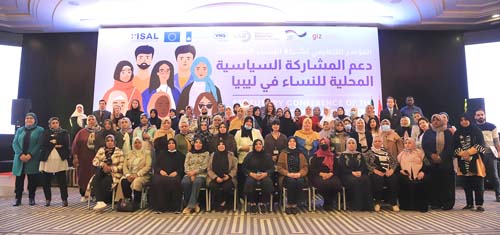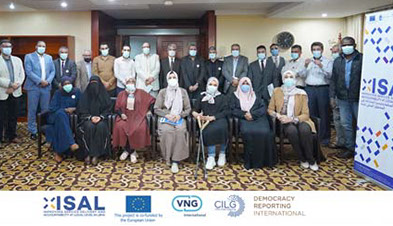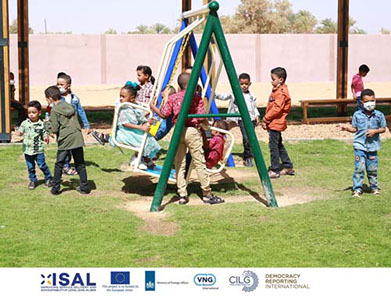Annual Update 2022 VNG International
‘VNG International has been working with us since 2014. Since the start of our municipal work, it has offered us a platform to speak up our thoughts, talk about challenges and problems and develop solutions. It has been voicing female officials and enabling them to make a change.’
Nadia Bousriwil,
President of the Women Elected Officials Network
‘We are fixing the dysfunction of the decentralization process in Libya caused by successive crises, within a very tight timeframe. This process required quick and resonant reflections and the exploitation of international benchmarks. VNG has shown commitment and responsiveness, and was very supportive and efficient during the process.‘
Mohamed Abuhelga, MLG
‘This urban park is the sole entrainement space in Sharguia in particular and the southern region in general .’
Emhemmed el Arbi,
Mayor of Sharguia
Statutory conference of the Women Elected Officials Network: supporting the local political participation of women in Libya (Tunis, November 2021)
‘The projects of CILG VNG International have a real impact on the work of municipalities in Libya. It is one of the leading organizations that respected its commitments despite the challenging security conditions. We continue to collaborate with CILG VNGi because we are aware of the importance of its objectives and the efficiency of their support.’
Youssef Ibdiri,
Mayor of Gheriane
Between 2019 and 2020, noticeably more women participated in NMCA activities
Project information:
https://www.cilg-international.org/en/programs-projects/programs-en/
https://www.facebook.com/CILGVNGLIBYA
News items:
https://www.vng-international.nl/node/594
https://www.vng-international.nl/node/501
https://www.vng-international.nl/node/647
https://www.vng-international.nl/node/697
Videos:
NMCA workshop: https://www.facebook.com/CILGVNGLIBYA/videos/410073230173183
WEON testimonials: https://www.facebook.com/CILGVNGLIBYA/videos/252795280170203
WEON conference & elections:https://www.facebook.com/CILGVNGLIBYA/videos/647314566611254



Dealing with Conflict, Fragility
and Migration by strengthening democratic
local government
Featured Project
Libya, Improved Service delivery at the Local level
Despite the complex and highly challenging operational context, VNG International and the Centre International de Développement pour la Gouvernance Locale Innovante (CILG) have successfully carried out activities in Libya since 2012. In 2019, VNG International and CILG started implementing the Improved Service delivery at the Local level (ISAL) programme in Libya, co-funded by the European Union and the Ministry of Foreign Affairs of The Netherlands.
By focusing on the capacity development of Libyan public institutions at the local and national levels, ISAL enables the environment for effective service delivery. In the meantime, developing the capacity of local governments and civil society through joint pilot projects, and engaging citizens by facilitating locally driven initiatives contributes to promoting collaborative governance and extensive participation by the Libyan population in the transition process.
ISAL offers support to different partners and beneficiaries at various levels, namely the High Commission for the Transfer of Competencies HTCT, the Ministry of Local Government MoLG, the Supreme Council of Local Administration SCLA, the Women Elected Officials Network (WEON), the National Municipal Councils Association (NMCA) and 15 municipalities across the country.
The programme contributes to the stabilisation of Libya through an adaptive approach, responding quickly to requests of the Libyan stakeholders, and coping with the changing political and institutional situation.
Key results of the work with the WEON:
- A Structured and Functional Network for More Efficient Gender Mainstreaming Actions ISAL worked on the Institutional building of the WEON by restructuring it, reviewing its statute and developing gender mainstreaming and lobbying and advocacy strategies to endorse women representativity in municipal councils, and participation in decision making processes.
- A Democratized Network for More Legitimacy The transparent and democratic internal elections organised by ISAL helped the WEON gain legitimacy among national and international stakeholders. Bridges are built between the network and various Ministries through meetings with the MLG and the Ministry of Youth to discuss the state of play of gender in Libya and advocate for more participation of women in public affairs. Working sessions were held for the first time with the Ministry of Women Affairs to elaborate a roadmap, paving the way for fundamental changes in the future.
- Elected women better prepared for local actions and the defence of women's interests Training sessions of elected women in communication, lobbying, and advocacy enabled them to better advocate for their cause namely raising the quota allocated to women in the electoral law.
Key results of the work with National Actors:
- Efficiently Assisting a difficult reform in a complex context MLG-led reforms have benefited from evaluation and benchmarking results to improve relevance and effectiveness while building capacity. ISAL supported the elaboration of strategies and policy papers (on the Transfer of competencies, waste management, municipal guard, communication strategy), thus contributing to enabling the environment for the activation of the decentralization process in Libya.
- Cooperated to establish and consolidate a training institute for local cadres A sustainable, organized, and professional structure endowed with a civil personality ensuring the continuous training of elected officials and local cadres. Trainings of Trainers were conducted by ISAL for the MLG, the SCLA and municipal staff on local administration, participatory local planning and development, and waste management policies.
Key results of the work with the National Municipal Council Association:
- A reinforced Local Government Association The institutional capacity of the NMCA has been strengthened, through advice on its structure, bylaws, and membership, and other colleague-to-colleague activities such as exchange visits between MLG and NMCA and their Tunisian counterparts.
- A Progressive, yet Efficient Gender-Inclusion in the LGA actions ISAL succeeded in making the NMCA more gender-sensitive through membership in the association and unprecedented women participation in the activities in support to the Libyan LGA.
Key results of the pilot projects:
- These ad-hoc projects are built on a learning-by-doing philosophy. They enable municipalities to practice the know-how acquired by training by implementing tangible projects. In a complex context characterized by the absence of resources, the local governments were able to deliver services and restore the confidence of their citizens
- In Wadi Bawanis, Gharyan, and Derj we developed Citizens Service Offices. The Citizen Service Office, or municipal one-stop-shop, is based on three main components. We invest in the development of an online application and the training of municipal officials on its use. An expert designs the application and we construct an open space as a front office for the municipality to receive requests and complaints. We provide training on communication with citizens to the relevant municipal staff.
- In Wadi Ottba, a pilot project on Municipal Waste Management with CILG VNGi because we are aware of the importance of its objectives and the efficiency of their support’. Youssef Ibdiri, Mayor was developed. This project providing the municipality with a municipal waste management plan, while increasing the awareness among citizens on the importance of environmental protection in the municipality and of participating in achieving this. The project is endorsed by the acquisition of tractors to support the municipality implement the plan.
- In Traghen, we launched a Centre for Women and Children. This centre strengthens the municipality's ability in providing and bringing services closer to women by creating a space to develop the capacities of women in various fields. It makes it easier for them to integrate into the labour market, for example by encouraging them to start their own business through trainings available at the Centre.
- In a Marada, an Eastern Libyan municipality, and Sharguia, a southern municipality, we constructed and opened an Urban Park, creating a safe public space for citizens to come together and meet. The urban park is designed in a way that stimulates group activities and takes into consideration specifically women’s and children’s needs in such spaces.